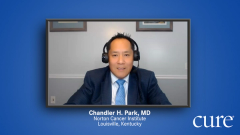
Combination Immunotherapy for Treating Advanced Renal Cell Carcinoma
An overview of the treatment protocol for patients with advanced RCC who are receiving IO/TKI or IO/IO combination therapy.
Episodes in this series

Transcript:
Chandler H. Park, MD: The last combination immunotherapy [IO] is nivolumab and ipilimumab together. This can be a very tough regimen. And the reason is with the other combinations, you only had one IO. With this medication, you have a nivolumab, which is a PD, ie, an IO checkpoint inhibitor. Then you add a second checkpoint inhibitor called ipilimumab, which is a CTLA-4. Now, what's the problem and what's the benefit of this combination? The benefit is, of all 4 different combinations t we have right now, this tends to have the highest duration of response. Duration of response means that you give the treatment a year from now, maybe 2 years from now.
They did a 5-year update. If the patients respond, are they going to continue to respond? Some of the updated data have shown up to 25% to 30% of the patients who respond tend to respond. But the question is, at what price? Using an analogy, I played baseball when I was younger, in high school and middle school. And as a baseball player, you could always try to hit and get a home run. But if you try to home run every time your strikeout rate goes up. Some baseball players, choke up…and try to get singles and doubles and they have a higher average and more of a contact. So using that analogy, if you used nivolumab and ipilimumab, you have a higher chance of a homerun, i.e. complete response [CR], ie, duration of response. But the problem is if you strike out because if you do IO, it either works or it doesn't work. If the IO doesn't work, that means it could be 3 months of not receiving any treatment. If the patient doesn't receive any treatment for 3 months, the cancer can spread. So that's what I think about for my patients.
If I patient in front of me is very symptomatic and doesn't make it through the IO, they might not get the second treatment, so that's what I look at. Now, in terms of the complete response and the response rate, the response rate was around 40%, which is a little bit on the lower side. The progressive disease was 18% to 20%, which means 1 out of 5 people when they get this medication 3 months from now, the cancer is going to spread as opposed to cabozantinib-nivolumab, which was about 5% to 6%. And pembrolizumab-lenvatinib, which was also 5% to 6%. So those are the high-level overviews.
Now, what about the adverse effects of this dual checkpoint inhibitor, since you're really revving up the engine, and really revving up the IO in your body, you tend to have more IO adverse effects. So what are the IO adverse effects? The IO adverse effects tend to be more thyroid conditions, patients can end up with low thyroid. So we check the thyroid levels more often, maybe every 6 weeks. We had this condition called adrenal insufficiency. Adrenal insufficiency means right about our kidneys, we have these hormones called adrenal glands, and the adrenal glands release hormones such as cortisol to keep our blood pressure up and so on. More of these patients can have this adrenal insufficiency because the cortisol level is low.
As a physician, we have to put our thinking caps on. With low cortisol levels you look at the potassium level, is the blood pressure low, and whether the patient’s performance status is weaker. If I check a 9 am cortisol level and it’s low, I put them on hydrocortisone. So those at the high level for all of the different trials, there are benefits of the combination and there's also downsides of the combination. To recap, if I use the IO and a tyrosine kinase inhibitor [TKI], you have a much higher response rate, ie, 70%, for instance, for the lenvatinib, and pembrolizumab, 70% to 71% of the patients respond. If you use the nivolumab and ipilimumab, only 40% respond. But if they respond, they can have a long-term duration of response.
In terms of the adverse effects of nivolumab and ipilimumab, they tend to be harder at the beginning of the treatment. You have to look for thyroid conditions, diarrhea, fatigue, coughing, and adrenal insufficiency. In terms of the TKI and the IO combination, you have to think more about high blood pressure, diarrhea, and hand-foot disease, where their hands are feet are red. So that's how I customize which patients get which treatment.
Tian Zhang, MD, MHS: This is a great question for patients receiving treatments and how they are logistically delivered in our cancer center. For ipilimumab-nivolumab, this combination is a pure IO combination that's given IV [intravenously] once every 3 weeks over the course of 4 cycles. Followed by nivolumab on its own every 4 weeks or so, based on the patient and all of those are IV infusions. When we add in the anti-VEGF [vascular endothelial growth factor] component, these are often given in pill form. So these are oral administration that patients take at home. If it's axitinib, it's actually given twice a day. Cabozantinib and lenvatinib, are agents given once a day. But these are oral pills that patients would take at home.
On the management of toxicities, when we're thinking about these treatment effects and if patients experience adverse events, if it's a pure IO combination, we often will start with either topical steroids for rashes or oral steroids if it's diarrhea or elevated liver function or something else that's related all to the immune activation. If it's on the anti-VEGF treatments and more likely associated with the pills, we will often hold the pills to start. And then also try to treat the adverse effects.
If it's something like hypertension, for example, we will often be increasing the blood pressure medications or adding another blood pressure medications for patients that are already on them, and then also hoping to treat through some of those toxicities by continuing the anti-VEGF blockade. If it's something like really bad diarrhea, then holding the VEGF therapy while we get a clearer picture. Figuring out if it is from the VEGF therapy or the IO with a very low threshold to add systemic steroids to calm down the immune system. We've seen over these large trials that adding the steroids for treatment of the immune activation and the toxicities do not affect the overall efficacy of the treatments themselves so I think patients should feel that as we're managing and treating the toxicities, their cancer is still being treated. And [they should] not be afraid if they have toxicity to mention those to their doctors so that the care team can really help them manage the very severe toxicities that they're having.
Transcript is AI-generated and edited for clarity and readability.






